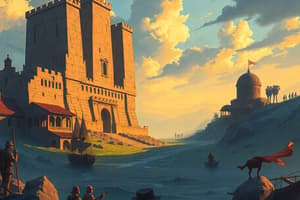Podcast
Questions and Answers
What defines a primary source in historical research?
What defines a primary source in historical research?
- It includes first-hand accounts or original documents. (correct)
- It is a collection of multiple types of historical data.
- It consists of summaries of primary sources for educational purposes.
- It provides an interpretation of past events by scholars.
Which statement best describes the role of secondary sources in historical studies?
Which statement best describes the role of secondary sources in historical studies?
- They offer first-hand accounts of historical events.
- They include original documents from the time being studied.
- They analyze and interpret primary sources. (correct)
- They provide detailed narratives of specific events.
Why is cross-referencing different historical sources important?
Why is cross-referencing different historical sources important?
- It ensures that original documents remain unchanged.
- It eliminates the need for secondary sources in research.
- It provides a singular perspective on historical events.
- It helps to strengthen interpretations and ensure accuracy. (correct)
What is a key benefit of studying history according to its importance?
What is a key benefit of studying history according to its importance?
How does historical understanding contribute to social progress?
How does historical understanding contribute to social progress?
What is a characteristic feature of historical periods?
What is a characteristic feature of historical periods?
Which method is commonly used by historians to analyze the past?
Which method is commonly used by historians to analyze the past?
Why is understanding historical context important?
Why is understanding historical context important?
What impact do major historical events have on societies?
What impact do major historical events have on societies?
What are secondary sources in historical research?
What are secondary sources in historical research?
What role do diverse perspectives play in historical analysis?
What role do diverse perspectives play in historical analysis?
Which is an example of a historical trend?
Which is an example of a historical trend?
What is a key aspect of how historians formulate historical narratives?
What is a key aspect of how historians formulate historical narratives?
Flashcards
Primary Source
Primary Source
Direct evidence from the past, such as letters, diaries, and official records.
Secondary Source
Secondary Source
Interpretations and analyses of primary sources, written by scholars.
Cross-referencing
Cross-referencing
Looking at different sources to get a complete picture.
History's Lessons
History's Lessons
Signup and view all the flashcards
Understanding Human Society
Understanding Human Society
Signup and view all the flashcards
Historical Periods
Historical Periods
Signup and view all the flashcards
Historical Trends
Historical Trends
Signup and view all the flashcards
What is History?
What is History?
Signup and view all the flashcards
Historical Context
Historical Context
Signup and view all the flashcards
Historical Figures
Historical Figures
Signup and view all the flashcards
Major Historical Events
Major Historical Events
Signup and view all the flashcards
Study Notes
Historical Periods and Trends
- History encompasses a vast range of human experiences, from early civilizations to current events.
- Periods like ancient, medieval, modern, and contemporary are used to categorize history; these periods are not strict and overlap.
- Historical trends are patterns of change and continuity across different societies and time periods. Examples include economic shifts, population changes, technological advancements, and political shifts.
Historical Methodology
- Historians use various research methods to understand the past. These methods involve critical analysis of primary sources (diaries, letters, records) and secondary sources (accounts by later scholars).
- Historians assess the reliability, biases, and context of sources.
- Historical analysis requires considering diverse perspectives and complex interactions between groups and societies.
- Historical interpretations are influenced by the questions asked and the evidence examined; diverse perspectives are crucial.
Historical Context
- Understanding historical context is key to interpreting events. Political, social, economic, and cultural conditions influence historical outcomes.
- Analyzing wars, revolutions, and economic crises within their contexts is crucial to understanding their importance.
- Complex historical events are shaped by interacting factors.
Historical Figures and Events
- Historical figures (leaders, artists, individuals) and events (wars, revolutions, discoveries) are studied to understand past societies.
- Their actions and contributions shape historical development.
- Major events profoundly affect subsequent societal development, altering political, social, cultural, economic, and technological systems.
- Different interpretations of historical figures/events offer diverse perspectives.
Historical Sources
- Primary sources (letters, diaries, records, artifacts) are firsthand accounts or original documents.
- Secondary sources (textbooks, scholarly articles) interpret primary sources.
- Different source types provide varying perspectives; cross-referencing strengthens interpretations and accuracy.
- Source availability and reliability vary across time and place, posing challenges for historians.
Importance of Studying History
- Studying history offers insights into the present by examining past events' causes, consequences, and patterns.
- Historical understanding improves decision-making by helping anticipate outcomes and complexities of current issues.
- History reveals how societies changed direction and provides lessons for the future.
- Understanding human interactions and social progress is enhanced through historical study.
Studying That Suits You
Use AI to generate personalized quizzes and flashcards to suit your learning preferences.




